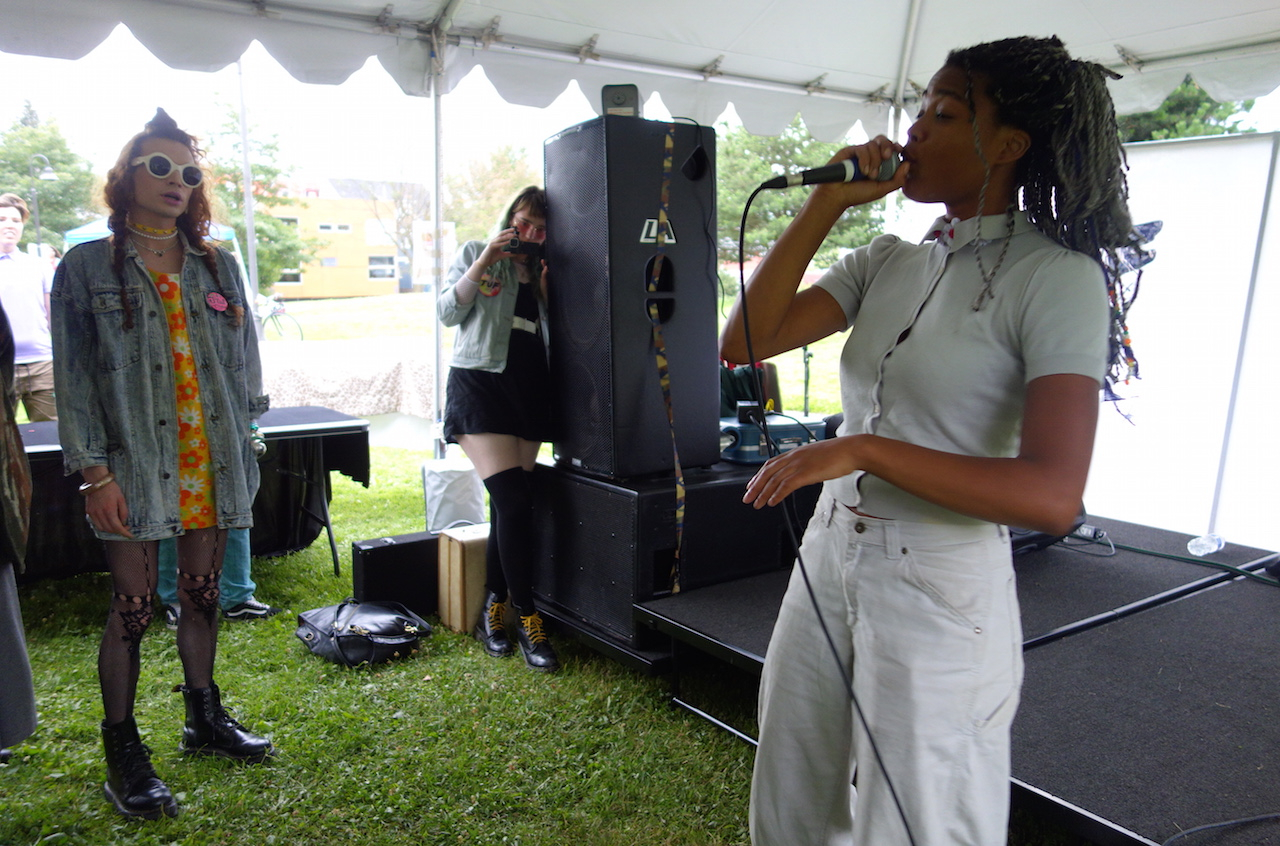- Two t-shirts summed up the first edition of TUF FEST: "The Future Is Female" and "Gender Is Over If You Want It." The free daylong event, combining workshops, panels, and electronic music, was the brainchild of Tuf, an intersectional collective of female-identified, non-binary and trans people in Seatlle. Forged in the birthplace of feminist rock movement riot grrrl, TUF harnesses that energy within another musical world dominated by men: dance music.
On a typical northwest summer day (rainy, sunny, cloudy, sometimes all at once), a crowd of 150 found their way to Judkins Park, a grassy expanse in a diverse residential neighborhood off the beaten path of the city's music scene. With a generous grant from the Seattle Office Of Arts And Culture, the TUF crew was able to pitch some tents, roll out a soundsystem and program a solid 12 hours for an audience that rarely sees itself reflected so prominently onstage.
The morning started with informal panels on pressing social justice topics like how, as a person of color, to navigate the "non-profit industrial-complex" and other cultural minefields. Renee Jarreau Greene, a DJ and promoter who might just be Seattle's answer to Venus X, emphasized the Black roots of dance music in one of the whitest cities in the country. Of her party Soul-Fi, she said: "We built this Black ass space in a mainstream club [Re-Bar]," while calling her more underground night, Darqness, a "reclaiming of space" that is "deeply necessary."
As she shared her trade secrets to a rapt audience, the sound of drum machines trickled through the air. Discwoman's Umfang was giving a workshop for aspiring beatsmiths, assuring them that there's no need to spend a year's rent on a vintage Roland 909. (While not on the festival bill, she later headlined the techno-heavy afterparty alongside Lena Willikens.)
The afternoon brought a wide-ranging selection of electronic music—at times too wide-ranging. Local jock EOSIN started off with a truncated set of dark, vocal-less house that didn't exactly jive with a summer afternoon. By contrast, the mellow études of Kaori Suzuki, a luminary in the local synth scene, hit just the right note. Transitioning from academic electronic music to something more pop-friendly, fellow Seattleites Nightspace and Red Alder showcased the dreamy, moody sound of the Pacific Northwest in consecutive live sets. This music was fine for lounging around to with some of Washington's legal weed, but it was DoNormaal, a California transplant grinding in Seattle's burgeoning hip-hop scene, who finally got the crowd on its feet with her syrupy drawl.
TUF FEST contended with the pitfalls that come with throwing a DIY event outdoors: the equipment was temperamental, the generator was noisy, and the unfortunate location—beneath the airport landing approach—disrupted some of the gentler performances. But as night settled in, the pop-up tent might as well have been a black box theatre for Virginia-based self-described "transevangelist" Elysia Crampton, who performed an audio-visual play called "Dissolution Of The Sovereign: A Time Slide Into The Future." The surreal set journeyed through gothic cumbia, death metal howls, poetry interludes and a dystopian sci-fi monologue about Bartolina Sisa, an 18th-century indigenous Bolivian who resisted Spanish colonialism, all backdropped by a montage of Andean landscapes and Latin American trans women victims and activists. It was deliciously weird and a fitting capstone, marking Crampton's first time headlining a festival—and in exactly the kind of safe space she and her community hope to create on and off the dance floor.
